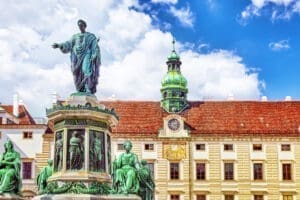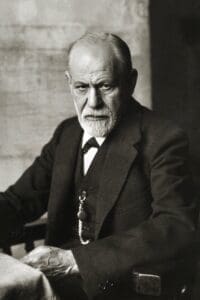Obtaining Austrian citizenship – Famous Austrian Jews
Hundreds of thousands of Israelis are eligible for Austrian citizenship under the new Austrian law. With that said, before you dive into the process you should learn a bit about the historic link between Jews and Austria.
Our law offices, located in Tel Aviv and Jerusalem, deal with emigration to Austria. If your ancestors left Austria between the years 1933-1955, chances are you are eligible for Austrian and European citizenship, like hundreds of thousands of other Israelis.

Famous Austrian Jews
For close to 150 years Austria was home to thousands of talented Jews, some reaching influential positions within the society. This was especially noticeable in the capital Vienna, which attracted about two hundred thousand Jews from Eastern Europe throughout the 19th century. A significant percent came from Czech and Hungarian backgrounds, with others coming from Bosnia, Serbia, Poland, Romania, Bulgaria and more.
In the period of the Jews’ immigration, Austria was a small part of the large Austro-Hungarian Empire, which ruled over a significant portion of Eastern Europe up until the beginning of the 20th century. As a result, citizens of the Empire could freely move between the countries under its rule, and many chose to settle in the more developed cities.
During those years Vienna was considered one of the most prosperous and developed cities in Western Europe. Vienna was a place of progress, modernization and enlightenment, and was home to leading universities of pioneering sciences. In fact, on a cultural level, Vienna matched the leading cities of the time such as Paris, London, Berlin, etc.
For these reasons, hundreds of thousands of Jews seeking a better life settled in the Austrian capital. As you will see in the following list, the Jews strengthened Vienna intellectually and made breakthroughs in nearly every field imaginable, in both intellectual and practical areas. Many historians have marvelled at this phenomenon — a large group of relatively poor and uneducated immigrants who successfully managed to climb society’s ranks and eventually take their place as leaders.
Among the fields in which Jews reached significant achievements were: physics, medicine, literature, banking, psychology, law, chemistry, photography, management of advertising offices, oriental studies, jewelry making, athletics, archaeology and trade — especially of textiles, wine, metals and meat.
We have assembled a list of fifteen Vienna Jews widely known for their contributions to a variety of disciplines such as economics, science, business etc. Of course, most of these names are particularly familiar among Israelis, thanks to their contributions being studied and memorialized in Israeli universities. Here is the list:
1. Martin Buber
1878-1965 – Bible commentator and philosopher with vast knowledge in many intellectual fields; wrote many important essays. Throughout his lifetime he interpreted, analyzed, and collated famous Jewish diaspora stories which had been retold as talmudic and hasidic tales for centuries. Buber studied and wrote on a broad range of subjects, including psychology.
2. Arthur Koestler
1905-1983 – Prolific author, journalist and philosopher. As early as elementary school, his teachers recognized him as a genius and a rapid learner. He grew up as a multilingual, speaking many languages, including German, English, French, Russian, Hungarian, Hebrew and Yiddish. As an adult he wrote particularly about politics and science. Moreover, he was an avid supporter of both Zionism and Communism. In his well-known book “The Thirteenth Tribe”, he claimed that the Jews of Eastern Europe were descendants of the Khazars. This caused a great deal of discussion in Israel and abroad in the 1950s and 60s.
3. Sigmund Freud
1856-1939 – Inventor of psychoanalysis. Worked as a talented neurologist in Vienna, often using special techniques to treat his patients. Today these techniques form the basis for the study of the mind — psychology. Freud’s unique research and their precise results paved the way for a better understanding of brain development, personality development and social behavior. Unlike other scientists of his era, Freud stood out in his ability to create an elaborate and impressive scientific thesis entirely on his own, without relying on previously accepted models. It is for good reason that Freud is world-renowned as one of the greatest intellectuals in history.
4. Stefan Zweig
1881-1942 – Prolific author known for his novels, plays and biographies. At the peak of his career during the 1920s and 30s, he became one of the most widely read and translated authors in the world. He promoted pacifism and strongly opposed arms races and wars. He lived through a tumultuous period in Europe marked by extreme nationalism. These drastic changes eventually lead him, together with his wife, to commit suicide in 1942 while on a vacation in Brazil. A note he left denoted the reason as “the downfall of enlightened Europe”.
5. Hilde Zaloscer
1903-1999 – A woman of broad horizons and a world-renowned professor of art history. Taught at several different universities in exotic cities such as Carleton (Canada), Alexandria (Egypt), as well as Vienna. Internationally famed as a specialist on Egyptian Coptic art. She was a Egyptologist, a historian, an author and one of the editors-in-chief of the comprehensive Coptic encyclopedia.
6. Alfred Adler
1870-1937 – Psychotherapist, inventor of “individual psychology”. He rose to fame after being invited by the world-famous Sigmund Freud to join a weekly discussion group held in Freud’s private home. This then led him to dive into the depths of psychoanalysis. Shortly after joining Freud’s group, Adler was nominated as head of the psychoanalysis association. However, he quit a year later due to disagreements with Freud. His psychological approach is centered on human impulses and the desire to gain power within society and to find one’s place in it via leadership of the individual.
7. Hugo Meisl
1881-1937 – One of the greatest soccer coaches in history. He made his main contribution while coaching the Austrian soccer team, which was highly esteemed in the 1930s. The team was named Wunderteam – “the Wonder Team”. Meisl assembled a phenomenal team which accrued many crushing victories versus formidable opponents such as Hungary, France, Germany, and more. In fact, Meisl paved the way for the famous “Total Football” tactic. He did this by instructing his players to make many short passes, as well as frequently swapping player positions. This tactic brought many future football teams to glory, such as Holland, Ajax, Bayern Munich, Spain, and above all Barcelona.
8. Karl Popper
1902-1994 – One of the most influential philosophers of the past century; knighted in Britain for his achievements. He became famous for challenging scientific conventions, on the one hand, and refining political ideologies on the other. In this he was led by what he saw as the catastrophes brought about by the European regimes, reaching their heights in the two world wars. These beliefs were the basis for the anti-nationalistic approach in his writings.
9. “Sir” Ernst Gombrich
1909-2001 – Historian, educator, writer and art historian, made famous by his books which shaped the understanding of the development of European art — from ancient times until the modern age. Two of his most popular books, which went through dozens of editions and were translated into over 30 languages, are “The Story of Art” and “A Little History of the World”. He served as head of the Warburg Institute in London, which focuses on the influences of ancient history on European culture.
10. Ludwig Wittgenstein
1889-1951 – Philosopher, highly educated and well-versed in a wide range of philosophical fields such as the philosophies of language, mind, mathematics and logic. In many academic circles he is considered the greatest philosopher of the 20th century. He influenced many people in the field of philosophy and thought, including Bertrand Russell, Yeshayahu Leibowitz, Thomas Kuhn and others.
11. Isidore Singer
1859-1939 – Author and editor; created the first Hebrew encyclopedia and founded the American League for the Rights of Man. Throughout his life he fought against anti-semitism which often surfaced in Europe, playing an active role in defending Jewish victims in incidents such as the Dreyfus affair and the Kishinev pogrom. For most of his life he was an active writer in German, English and French.
12. Paul Felix Lazarsfeld
1901-1976 — World-renowned sociologist. His studies on the influence of mass media on society became classics in the field. Using his successful polls, he created several pioneering methods in the study of human interaction and its manifestation in the interaction between groups. He taught in the University of Vienna before emigrating to the United States to escape rising anti-semitism. He was appointed head of the American Sociology Association and took part in special US government projects.
13. Viktor Frankl
1905-1997 — Professor of neurology at the University of Vienna and renowned psychiatrist. He became famous for the psychological method he developed, called logotherapy — a method centered around the patient’s desire for meaning. Frankl wrote 39 books, of which the most famous is “Man’s Search for Meaning”. This book took on a special meaning due to the fact it was written while Frankl was imprisoned in the Nazi concentration camp Theresienstadt.
14. Michael Biedermann
1769-1843 – Nicknamed “The Royal Jeweller”, textile manufacturer, banker, philanthropist and businessman. He was one of the founders of the Jewish community in Vienna, and helped plan and build the first synagogue there, known as “The Great Synagogue”, in the years 1825-1826. He made a name for himself as “the Austrian Emperor’s Jeweller” thanks to his expert engravement skills and was also put in charge of designing and engraving the emperor’s stamps.
15. Max Perutz
1914-2002 – Nobel prize winner for chemistry together with colleague John Kendrew in the year 1962 for his contribution to researching the structure of hemoglobin and myoglobin. An entrepreneur and a visionary, he founded the molecular biology laboratory in Britain. The laboratory is run and supervised by the Medical Research Council in the United Kingdom. He laid the path for future biologists to decode the structures of many different proteins.
Some history of the Jewish community in Vienna
During the 1920s, one in every nine people in Vienna was Jewish. The city was home to the sixth largest Jewish population of its time, a little over 200,000 in total. The large-scale Jewish immigration was partly due to the civil rights granted to Jews by the local authorities in the first half of the 19th century. In those times, such civil rights were unknown outside of countries like the United States, France, the Netherlands and a few German principalities. The Jews gained rights to live anywhere in the empire, to own property, and to acquire professional training without suffering from religious discrimination, as well as a plethora of other privileges.
A few figures will illustrate the Jews’ population expansion in Vienna: in the year 1857 there were fewer than 3,000 Jews living in Vienna; twelve years later that number had risen to 40,000. By the year 1890 there were close to 120,000 Jews, and by 1923 there were more than 200,000. However, following the Nazi party’s rise to power and its subsequent effects on the Austrian people, about 35,000 Jews left Austria for western Europe, the United States, South America, etc.
Notable achievements by Austrian Jewry
Austrian Jewry is viewed as a rare social phenomenon. Living amongst a xenophobic people unaccepting of strangers, the Jews managed to prosper against all odds. In large numbers, they developed their skills in an outstanding fashion. In fact, the Jews’ level of success is unmatched in history, considering they only accounted for about 4 percent of the Austrian population. This small sect stood out in the social scene, to the point where Jews were responsible for much of the nation’s affairs, whether it was in the various sciences, psychology, entrepreneurship, business, development or other fields.
Some statistics on the Jewish community: in 1934, more than half of all medical doctors in Vienna were Jews. Furthermore, Jews made up a third of all pharmacists, 40% of all jewellers, 75% of the bank managers, 85% of the lawyers, 63% of the cinema owners, 74% of the wine merchants, 40% of the cafe owners, more than 30% of the photographers, 21% of the opticians and 95% of advertising office managers. Metals were considered an exclusively Jewish trade, and Jews made up about 70% of textile merchants and a third of all watchmakers in Vienna.
Benefits of Austrian citizenship
Austrian citizenship is considered the most sought-after citizenship among Israelis. For years Austria has been regarded as one of the countries offering a high quality of life by international standards. This is in addition to the generous Austrian social benefits and the exclusive advantages of having a European passport. On top of it all, Austria has a breath-taking natural landscape, situated between Italy, Switzerland and Germany, and famous for its snow-topped Alpine mountain ranges.
The Austrian passport comes with the exclusive benefits reserved for citizens of the European Union. These benefits include living and working in countries in western Europe such as Germany, Italy, France and the Netherlands without any restrictions, in addition to subsidized European health care, the ability to open a business, subsidized academic studies, freedom of passage between European countries, and many more exclusive benefits.
Contact us — Acquiring Austrian Citizenship — Famous Austrian Jews
Our office for emigration to Austria offers comprehensive assistance in the process of acquiring Austrian citizenship under the new law. Our office’s German department is responsible for translating all the necessary documents and maintaining direct contact with the Austrian departments responsible for approving citizenship applications.
מאמרים מומלצים



